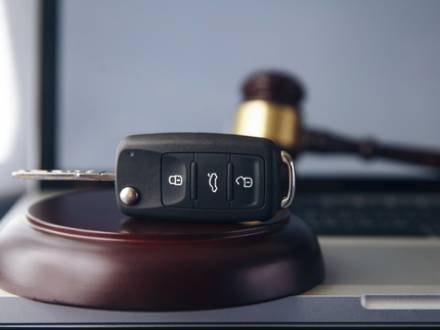1425 McHenry Road, Suite 204, Buffalo Grove, IL 60089
●Free Initial Consultation
Recent Blog Posts
Illinois DUI Charges with Your Kids in the Car
 Illinois law imposes extra penalties when a DUI charge involves a child passenger. If you are in this position, you are probably carrying a lot of worry at once: your child’s safety, your license, your job, and what this could mean for your family. A charge is not the same as a conviction, and there are still ways to respond.
Illinois law imposes extra penalties when a DUI charge involves a child passenger. If you are in this position, you are probably carrying a lot of worry at once: your child’s safety, your license, your job, and what this could mean for your family. A charge is not the same as a conviction, and there are still ways to respond.
If you are facing DUI charges in 2026, our Deerfield, IL DUI defense lawyer can help you understand what you are facing and take practical steps to protect your rights and your family.
Does Having a Child in the Car Increase DUI Penalties in Illinois?
Under 625 ILCS 5/11-501, if you are convicted of DUI while transporting a child under age 16, Illinois law adds penalties.
THC Beverages Are Coming to the United Center: What This Means for Attendees
 According to an ABC7 Chicago report, the United Center is expected to become the first major arena in the country to offer THC beverages. Cannabis products are becoming part of mainstream entertainment. However, that does not remove the risk of criminal charges, especially DUI charges, when law enforcement believes the products are used irresponsibly.
According to an ABC7 Chicago report, the United Center is expected to become the first major arena in the country to offer THC beverages. Cannabis products are becoming part of mainstream entertainment. However, that does not remove the risk of criminal charges, especially DUI charges, when law enforcement believes the products are used irresponsibly.
If you plan to attend an event in Chicago in 2026, it is important to understand the rules before you go. Our Lake County, IL criminal defense lawyer can help.
What Is Changing at the United Center in Chicago?
THC drinks will be sold at concerts and select live events. They will not be available during Chicago Bulls or Blackhawks games because of league rules. Each beverage is expected to contain about five milligrams of THC. While that may sound small, even low amounts can affect focus, reaction time, and judgment.
Violating Scott’s Law in Illinois Can Now Carry More Serious Penalties
 In 2026, Illinois expanded Scott’s Law to protect more roadside workers after an increase in deadly crashes involving people working near active roadways. The change was meant to improve safety, but it also means drivers now face more severe traffic violations if they are accused of not slowing down or moving over when required. If you are dealing with a citation, a Lake County, IL traffic violations defense lawyer can help you understand what the updated law requires and what options may be available.
In 2026, Illinois expanded Scott’s Law to protect more roadside workers after an increase in deadly crashes involving people working near active roadways. The change was meant to improve safety, but it also means drivers now face more severe traffic violations if they are accused of not slowing down or moving over when required. If you are dealing with a citation, a Lake County, IL traffic violations defense lawyer can help you understand what the updated law requires and what options may be available.
What Is Scott’s Law in Illinois?
Scott’s Law is Illinois’s "move over" law. It requires drivers to slow down and, when possible, change lanes when approaching certain stopped vehicles with flashing lights.
Diversion Programs for First-Time Shoplifters in Illinois
 As of 2026, diversion programs continue to be used in Illinois for lower-level retail theft cases, especially when the person has no prior criminal record. In a 2025 report from the National Retail Federation, retailers across the United States reported an 18 percent increase in shoplifting incidents compared to the prior year.
As of 2026, diversion programs continue to be used in Illinois for lower-level retail theft cases, especially when the person has no prior criminal record. In a 2025 report from the National Retail Federation, retailers across the United States reported an 18 percent increase in shoplifting incidents compared to the prior year.
First-time shoplifters in Illinois may qualify for diversion programs that allow them to resolve the case without a criminal conviction if certain conditions are met. For someone facing a first shoplifting charge, the situation can feel overwhelming. If you are in this situation, a Lake County, IL shoplifting defense lawyer can help determine whether a diversion program may be an option.
Penalties for Repeat DUIs in Illinois
 Illinois imposes strict penalties for the crime of driving under the influence (DUI). With every repeat offense, you face increasing punishments. If you have been charged with a repeat drunk driving offense, get in contact with a Lake County, IL criminal defense lawyer now.
Illinois imposes strict penalties for the crime of driving under the influence (DUI). With every repeat offense, you face increasing punishments. If you have been charged with a repeat drunk driving offense, get in contact with a Lake County, IL criminal defense lawyer now.
At The Law Offices of Matthew R. Gebhardt, P.C., we take DUI defense seriously, especially when it involves higher stakes for the defendant. Attorney Matthew Gebhardt has a proven track record of successfully defending clients accused of DUI, including clients with multiple offenses on record. With our experience and legal knowledge, you can rely on us to fight for your rights against a drunk driving charge.
How Serious Is a First DUI?
Though many people believe it is a minor offense, a first DUI still carries major penalties. The crime is usually charged as a misdemeanor, but it can still result in jail time, fines, and mandatory alcohol education programs under 625 ILCS 5/11-501.
What Are the Penalties for Underage DUIs?
 Driving under the influence (DUI) is prohibited under Illinois law, but drivers under 21 are subject to even stricter laws to deter drinking and driving. If you have been accused of underage DUI, you should know that you face serious criminal prosecution, including the possibility of jail time. In cases like these, a Lake County, IL criminal defense attorney can provide you with aggressive representation to protect your rights.
Driving under the influence (DUI) is prohibited under Illinois law, but drivers under 21 are subject to even stricter laws to deter drinking and driving. If you have been accused of underage DUI, you should know that you face serious criminal prosecution, including the possibility of jail time. In cases like these, a Lake County, IL criminal defense attorney can provide you with aggressive representation to protect your rights.
At The Law Offices of Matthew R. Gebhardt, P.C., we have successfully defended many clients accused of driving under the influence, including numerous dismissals and not guilty verdicts. We will fight for the best possible outcome given the facts of your case, whether it means minimizing the charges or getting the case dismissed altogether.
Can You Claim Self-Defense in a Domestic Battery Case?
 When a dispute inside a household escalates to violence, one or sometimes both parties may be arrested for domestic battery. However, there are cases where one party in a domestic dispute is wrongfully arrested for exercising reasonable self-defense. If you have been charged with domestic battery, a Lake County, IL criminal defense lawyer can help protect your rights and interests.
When a dispute inside a household escalates to violence, one or sometimes both parties may be arrested for domestic battery. However, there are cases where one party in a domestic dispute is wrongfully arrested for exercising reasonable self-defense. If you have been charged with domestic battery, a Lake County, IL criminal defense lawyer can help protect your rights and interests.
At The Law Offices of Matthew R. Gebhardt, P.C., we have years of experience representing clients in a broad range of criminal cases, including multiple successful dismissals of domestic battery charges. Our firm can help you explore self-defense as a legal strategy and identify ways to minimize the charges against you.
When Is Self-Defense Permitted Under Illinois Law?
In some situations, people charged with battery or other crimes of violence in Illinois can claim self-defense – a strategy that can result in reduced or dismissed charges. However, certain elements must be satisfied to satisfy the definition of lawful self-defense under 720 ILCS 5/7-1.
Can You Be Charged with Domestic Battery if You Are Both Fighting?
 When we think of domestic battery, we generally think of an abuser and a victim. This is often the reality in many cases, but sometimes, a relationship can be mutually abusive and both people are consistently physically and emotionally violent toward each other. While less common, some studies suggest that a significant number of domestic violence cases involve both partners engaging in physical or emotional aggression.
When we think of domestic battery, we generally think of an abuser and a victim. This is often the reality in many cases, but sometimes, a relationship can be mutually abusive and both people are consistently physically and emotionally violent toward each other. While less common, some studies suggest that a significant number of domestic violence cases involve both partners engaging in physical or emotional aggression.
When the police show up and both people are accusing each other of abuse, things can get complicated fast. If you have been charged with domestic abuse, you need an aggressive, experienced Libertyville, IL criminal defense attorney from The Law Offices of Matthew R. Gebhardt, P.C..
What Constitutes Domestic Battery in Illinois?
To better understand claims of mutual abuse, you need to know what Illinois courts consider domestic battery. Under state law, you can be charged with domestic battery for knowingly causing bodily harm to someone in your family or household, or otherwise making physical contact with a family or household member in an insulting or provoking way.
How Can I Get a Felony Reduced to a Misdemeanor?
 A felony conviction can wreak havoc on your life. In addition to the possibility of years in prison and tens of thousands of dollars in fines, you may face severe difficulty getting approved for loans, finding employment, or securing housing with a felony on your record. Seeking legal representation for these cases is highly advisable, as an attorney can look for ways to avoid a conviction or reduce the charge to a misdemeanor.
A felony conviction can wreak havoc on your life. In addition to the possibility of years in prison and tens of thousands of dollars in fines, you may face severe difficulty getting approved for loans, finding employment, or securing housing with a felony on your record. Seeking legal representation for these cases is highly advisable, as an attorney can look for ways to avoid a conviction or reduce the charge to a misdemeanor.
Effectively fighting a felony charge requires a deep knowledge of the law. At The Law Offices of Matthew R. Gebhardt, P.C., our Waukegan, IL criminal defense lawyer has years of valuable experience, and he has spent a considerable portion of his career as a prosecutor for the Cook County State’s Attorney’s Office.
Exploring Mitigating Circumstances to a Felony Charge
Sometimes, what starts out as a felony charge can be reduced to a misdemeanor charge based on a strong argument and a close review of the facts. For example, unlawful possession of marijuana (720 ILCS 550/4) can be charged as a Class 4 felony if you were accused of possessing more than 100 grams, but anything less than that is a misdemeanor charge (assuming it is your first offense). A defense attorney may be able to dispute how much of the substance really belonged to you, potentially getting the charge reduced.
Criminal Defense for White-Collar Professionals Facing Drug Charges
 If you work a white-collar job, an accusation involving a drug crime could have serious ramifications for your future. Depending on the offense, you could end up facing years or even decades behind bars if you are convicted. Knowing the potential risks, seeking out legal representation is paramount for protecting your rights.
If you work a white-collar job, an accusation involving a drug crime could have serious ramifications for your future. Depending on the offense, you could end up facing years or even decades behind bars if you are convicted. Knowing the potential risks, seeking out legal representation is paramount for protecting your rights.
At The Law Offices of Matthew R. Gebhardt, P.C., our Lake County criminal defense lawyer represents white-collar professionals facing drug charges. In prior case results, he has negotiated for favorable verdicts for people accused of felony drug charges, including successful dismissals.
How a Drug Charge Can Affect Your Professional Reputation
A conviction of drug possession or distribution can have immediate consequences for your career. The record of the conviction will appear on any background checks run by your employer, and since Illinois is an at-will employment state, a discovery of a misdemeanor or felony drug conviction could result in your termination.

















